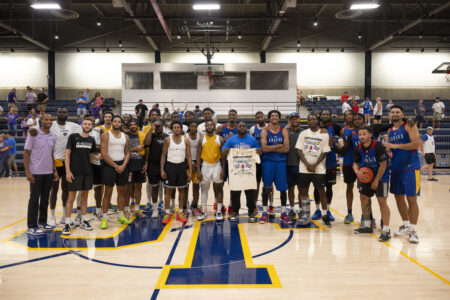Tom Keegan: Keller explains A&M’s ‘miracle’
With Texas A & M down 12 points to Northern Iowa and 35 seconds remaining, even late, great Yogi Berra, squatting behind heaven’s home plate, no doubt declared the game over and headed for the clubhouse.
Texas A & M caught up, forced overtime and won it in the second overtime, 92-88.
A & M scored 14 points in its final six possessions. Full-court pressure resulted in UNI turning it over four times in five possessions.
Even the one bucket the Panthers scored, a breakaway dunk on a home run pass, backfired because it happened too quickly. Dribbling some clock away would have been more efficient.

Kyle Keller
When pressed and forced into throwing panicky passes that were intercepted, the Panthers would have served themselves better if they had thrown the ball straight up in the air as high as they could, killing time off the clock. Or just holding onto the ball for 10 seconds and taking a turnover a couple of times, although at some point A & M would have changed its strategy and started fouling. (The five-second rule only applies to those in possession of the ball in the frontcourt, not the backcourt).
Taking a short break from preparing for a Sweet 16 game against Oklahoma, Kyle Keller, assistant to A & M head coach Billy Kennedy, returned a phone message to discuss the comeback that defies explanation.
“Billy said after the game, and he believes this, he said, ‘It’s not about coaching. It wasn’t about the players. This was a miracle, a miracle from God.’ And it was,” Keller said. “Not to get real religious on you, but that stuff doesn’t happen without divine intervention. It never happened before in the history of the game.”
Keller said that Kennedy drilled his players to trying trapping without fouling one time each possession, and it worked to perfection.
The comeback couldn’t have happened to a nicer guy than Kennedy, according to Keller.
“He’s made me appreciate there is more to life than basketball,” Keller said of Kennedy, in his fifth season as head coach at A & M. “We never practice on Sunday. He believes that time is to be with your family. Basketball doesn’t define who he is.”
Nor, Keller said, does Parkinson’s Disease, with which Kennedy was diagnosed in his first season in College Station.
“To see a guy faced with mortality and overcome it, and I say overcome it, I mean he doesn’t let the disease define who he is,” Keller said. “I watch him impact and influence people and become healthier today than he was five years ago. He doesn’t have the symptoms he did in Year 1 or Year 2, and the kids draw strength from him.”
Keller said it has been remarkable watching Kennedy.
“Very tough man, very tough-minded person,” Keller said. “And he’s a really good coach.”
Keller pointed out that it’s the third Div. I school (Southeastern Louisiana, Murray State) that Kennedy has coached to a single-season record for victories.
Keller has played a big role in Texas A & M upgrading its talent by tapping his long-nurtured recruiting ties in the state of Texas.
An Oklahoma State alumnus, Keller has coached at his alma mater (1999-2008) and worked under Bill Self at Kansas as video coordinator (2008-11) before going to work for Kennedy. Keller has seen a lot in his day, but never anything like what he witnessed Sunday. There is a reason for that. It never had happened in a Div. I game, a team erasing a 12-point deficit in less than a minute.
“I had somebody text me today, ‘You know, that team will go down forever in March Madness history.’ I hadn’t thought about it that way, but he’s probably right,” Keller said. “They’ll probably always refer to that game one way or another.”
And centuries from now, Keller boys and girls will look at their portable air-screen televisions and boast, “My great-great-great-great-great-great-great-great grandfather was one of the Aggies’ coaches in that game.”







